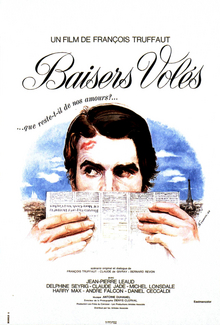|
Stolen Kisses
Stolen Kisses (French: Baisers volés) is a 1968 French romantic comedy-drama film directed by François Truffaut, starring Jean-Pierre Léaud, Delphine Seyrig, and Claude Jade. It continues the story of the character Antoine Doinel, whom Truffaut had previously depicted in The 400 Blows (1959) and the short film Antoine and Colette (1962). In this film, Antoine begins his relationship with Christine Darbon, which is depicted further in the last two films in the series, Bed & Board (1970) and Love on the Run (1979). The original French title of the film comes from a line in Charles Trenet's song "Que reste-t-il de nos amours ?," which is also used as the film's signature tune. The film was nominated for the Academy Award for Best Foreign Language Film.[3] The film begins with a pan onto the locked gates of the Cinémathèque Française, then based at the Palais de Chaillot. On the gates, there is a sign 'Relache' ('Closed'). This is Truffaut's reference to the Affaire Langlois when the head of the Cinémathèque had been fired by the French government. He was eventually reinstated after filmmakers such as Truffaut used all their wiles to foment protest. PlotAntoine Doinel, now a young man, is discharged from the army as unfit, because he prefers to read novels and write to his sweetheart, violinist Christine Darbon, than to obey his superiors. He has written to Christine voluminously (but, she says, not always nicely) while in the military, sometimes more than once a day. However, she never wrote him back. Christine is away skiing with friends when Antoine arrives, and her parents must entertain him themselves, though glad to see him. After learning that Antoine needs a job, Christine's parents help him get hired as a night clerk in the Hôtel Alsina, where he spends most of his time reading. Christine goes to see him there, and, after not seeing each other for such a long time, they seem to hit it off. One morning, a man accompanied by a private detective makes Antoine lead them to a room where a woman has recently checked in. The woman turns out to be the man's wife and is sharing the bed with someone else when Antoine and company enter her room. Furious, the woman's husband starts trashing the room. Antoine gets blamed for the resulting commotion and loses his job. However, he later strikes up a friendship with the detective and gets hired at the latter's agency. Antoine's detective friend teaches him the tricks of trade. The job, however, separates Antoine from Christine, as trying to pay attention to her and shadow people at the same time starts to be too much for him. One evening, Georges Tabard, the owner of a shoe store, visits the agency wanting to find out why no one seems to like him. Despite never having worked in a store and being quite clumsy, Antoine poses as a stock boy to solve that mystery. Soon, he falls for Georges's wife, Fabienne, who willingly seduces him. Smitten with her and seeing his current romantic situation as hopeless, Antoine breaks up with Christine, saying he has never "admired" her. The agency starts to suspect that Fabienne is cheating on their client, and Antoine is forced to come clean. The same day he is fired from the agency, his detective mentor passes away. Antoine eventually becomes a TV repairman and avoids Christine at all costs. One day, his poor driving skills make him crash a van with the car of Christine's dad. However, no one gets harmed. Christine's dad forgives him and later talks to his daughter about Antoine's new job. To win him back, Christine deliberately disables her TV and calls Antoine's company for repairs while her parents are away. The company sends Antoine, whose lack of skills makes him try for hours to fix a TV that is only missing a tube. Taking advantage of this opportunity, Christine reconciles with Antoine, and the two have sex. The next morning, without saying a word, Antoine propose to her, and she accepts. The newly engaged Antoine and Christine later stroll in a park. A man who has trailed Christine for days approaches the couple and declares his love for Christine. He describes his love as "permanent" and unlike the "temporary" love of "temporary people." When he walks away, Christine presumes that the man is insane. Antoine, recognising similarities in much of his own behaviour, admits, "He must be." Cast
References to other Truffaut films
ReleaseCritical responseStolen Kisses was well-reviewed by critics all over the world. The film has an approval rating of 97% on review aggregator website Rotten Tomatoes, based on 29 reviews, and an average rating of 7.8/10. The website's critical consensus states: "Stolen Kisses is a fine feature follow-up to The 400 Blows, transforming Antoine Doinel into a sympathetic, silly, and romantic figure that carries to the series' end".[5] In an enthusiastic review for The New York Times (4 March 1969), Vincent Canby commented:[6]
Danny Peary called it "François Truffaut's witty, sad, insightful meditation on Love, encompassing passion, courtship, confusion, conflict, romance, jealousy, disloyalty, dishonesty, sex, conquest, and commitment (and second thoughts)."[7] Awards and nominations
See also
References
External links
|
|||||||||||||||||||||||||||||||||||||||||||||||||||||||||||||||||||||||||||||||||||||||
